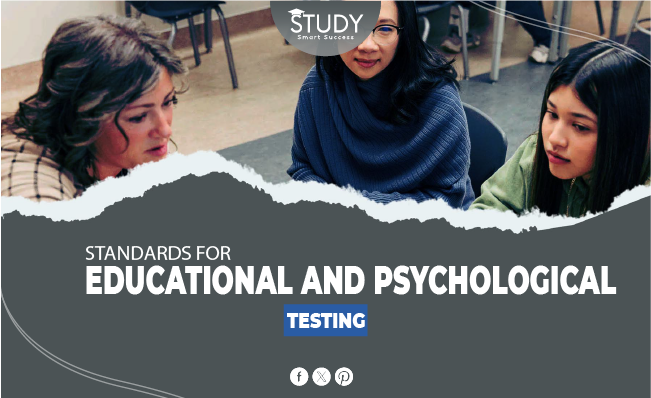In education and psychology especially, testing and evaluation are absolutely vital. They offer insightful analysis regarding student learning, mental health, and more. Following psychological and educational exam policies guarantees these tools’ honest and proper performance. This all-inclusive tool clarifies and guides teachers, scientists, and researchers on these ideas.
Understanding the Importance of Standards
Psychological and educational examinations are standardized for reliability, accuracy, and fairness. These guidelines assist professionals in designing, administering, and interpreting tests to treat everyone reasonably and preserve their rights. Professionals can make intelligent choices based on test results if they follow these guidelines. This can help with both educational success and psychological treatments.
Ethical Considerations
These conventions center on deep social concerns. These standards ensure that tests respect test takers’ privacy, are used as intended, and do not favor any one group. Professionals have to grasp and abide by these ethical guidelines if we are to maintain the testing process honestly.
Technical Rigor in Test Development
It is imperative to underline how technically difficult it is to create a test in order to satisfy the psychological and educational criteria mentioned. Technical thoroughness guarantees that tests are grounded not only in strong science but also in the most recent knowledge of the subject.
Psychometrics calls for the design, validation, and scoring of tests. Following scientific excellence helps professionals guarantee test accuracy, dependability, and validity over several populations. This dedication lowers mistakes and prejudices, therefore improving the fairness and utility of testing.
Critical Standards for Educational and Psychological Testing
From designing and assessing tests to administering them and calculating what scores indicate, the rules address numerous testing domains. Some of the most important guidelines that professionals ought to be familiar with are listed here:
1. Validity
The validity of a test is its capacity to measure what it says. This criterion underlines the need for a good test design and the meaning of test numbers for certain uses.
2. Reliability
This criterion tackles consistency in test scores over forms, sessions, and raters. Conclusions from test data have to be reliable.
3. Fairness
Fairness in testing refers to making sure all test-takers are treated fairly and that tests are created and administered reasonably. Examining cultural and linguistic variation helps one create and interpret exams with consideration.
4. Accessibility
Often mandated by law, ensuring everyone—including those with disabilities—can take tests is the proper thing to do. This standard guides people in making changes and other forms.
5. Confidentiality
Maintaining the anonymity and privacy of test-takers is quite crucial. Professionals should handle test results carefully and safely; they should only share them with authorized persons.
Implementing Standards in Practice
Professionals must maintain current with the most recent best practices and engage in continuous professional development if they are to meet these criteria. Teachers, researchers, and others working together will help to guarantee appropriate testing and ongoing development.
Challenges and Solutions
Executing these guidelines is not always simple. Among the several instances are inadequate resources, a lack of desire to change, or ignorance about the issue. People must strive for enough money, maintain workers’ training, and share the knowledge of how crucial standards are in testing if they are to find answers.
Professional Development and Training
Experts have to maintain high exam standards by constantly studying and training. This course of instruction should address fresh approaches, social issues, and technologies capable of impacting testing and review. Professionals in testing have to be always adaptable and learn constantly. They might thus maintain current with their psychological techniques and educational background.
Collaboration for Improvement
Collaboration between fields helps test effective methods. Education, psychology, technology, and policymaking professionals cooperate to share ideas, question approaches, and find new solutions.
We can build more fair, effective, and open testing techniques that benefit more people.
Technological Advancements in Testing
Technology in testing can be both useful and challenging. Digital platforms can streamline testing and offer more exact data to enable you to understand results.
On the other hand, pros must be cautious regarding digital equality issues and how technology could lead to new prejudices or obstacles. Today’s workers must keep current on new technology and carefully consider how they could influence testing.
Advocacy and Policy Development
Professionals also have to advocate and assist in policy development to ensure high standards in psychological and educational assessments. They must thus advocate laws protecting people’s rights and privacy, regulations supporting fair testing, and financing for such initiatives.
By influencing policy, pros can ensure that the following testing criteria are followed ethically and comprehensively, improving the world.
Continuous Evaluation and Feedback
Ultimately, successful and fair testing calls for technique evaluation and update. Real-world data and public comments help to review and improve testing methods, standards, and results.
Supporting continuing development may assist specialists in updating psychological and educational exam standards with social changes and new learning and feeling research.
Conclusion
Psychological and educational test standards are essential for ensuring that evaluation methods are moral, accurate, and dependable. By following these guidelines, professionals can make a big difference in people’s lives and the educational and psychology groups. As technology improves and new studies emerge, testing and the standards that guide our work will also change.
All educational and psychological testing professionals must be aware of these requirements and engaged.
Under these circumstances, assessments may assist education and psychology students to grow and learn.



